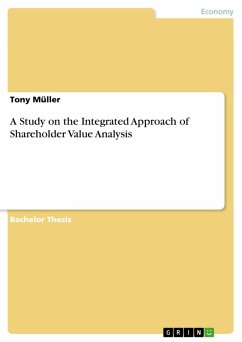Bachelor Thesis from the year 2011 in the subject Business economics - Miscellaneous, grade: 1,7, University of Lincoln, course: Business Studies, language: English, abstract: The theory of shareholder value is an issue that has to comprise a dichotomy in terms of the standpoint from which it is looked at. Shareholders and the management of a company in many cases still represent counterparts whereas interests do not continuously align. In this study shareholder value theory is approached by investigating the shareholder perspective in correspondence to shareholder wealth gains in the UK market environment through the implementation of six major financial performance measurement methods including: the Price/ Earnings ratio, the Discounted Cash Flow Model, the Dividend Valuation Model, the Economic Value Added, the Market Capitalization, the Capital asset Pricing Model and the shareholder value approach as suggest by Alfred Rappaport. Having applied them to six selected stock listed companies enabled the author to develop a shareholder value ranking according to their financial performance and the deriving shareholder value dedication.
Dieser Download kann aus rechtlichen Gründen nur mit Rechnungsadresse in A, B, BG, CY, CZ, D, DK, EW, E, FIN, F, GR, HR, H, IRL, I, LT, L, LR, M, NL, PL, P, R, S, SLO, SK ausgeliefert werden.









